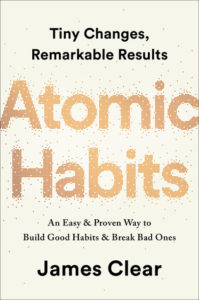
Atomic Habits offers practical advice on how to start new habits or get rid of bad habits. Here are some notes:
- Don’t underestimate marginal gains, if you get 1% better every day, you become 37x better in a year
- Your outcomes are a lagging measure of your habits: money (financial habits), weight (eating habits), knowledge (learning habits)
- People reflect your behavior back to you. The more you help others, the more others help you.
- Instead of setting goals, focus on having systems (goal: losing 10 pounds vs system: learning to eat well)
- Identity based habits: Focus is on who you wish to become
- read a book vs become a reader
- run a marathon vs become a runner
- learn an instrument vs become a musician
- The habit loop consists of:
- cue: signal reward (notice) -> make it obvious
- craving: acting force (want) -> make it attractive
- response: action (d0) -> make it easy
- reward: result (get) -> make it satisfying
- Be specific with your habits: I will [BEHAVIOR] at [TIME] in [LOCATION]
- Habit stacking: Start a new habit by doing it before / after an existing habit
- Environment matters: Drug addict soldiers stop their addiction when they return home from the war
- Two groups were given different tasks: a) Only take high quality photos b) Only take as many photos as you can. Best photos came out of the quantity group
- To visualize virtual progress, you can put physical objects things from one jar to another
- Reframe cues: Exercise as building endurance, saving money as increasing your future means
- To stop procrastination, scale down habits to their 2 minute version:
- “Read before bed each night” becomes “Read one page.”
- “Study for class” becomes “Open my notes.”
Overall, it was one of the most actionable, well written and interesting books I’ve read recently, highly recommended!
